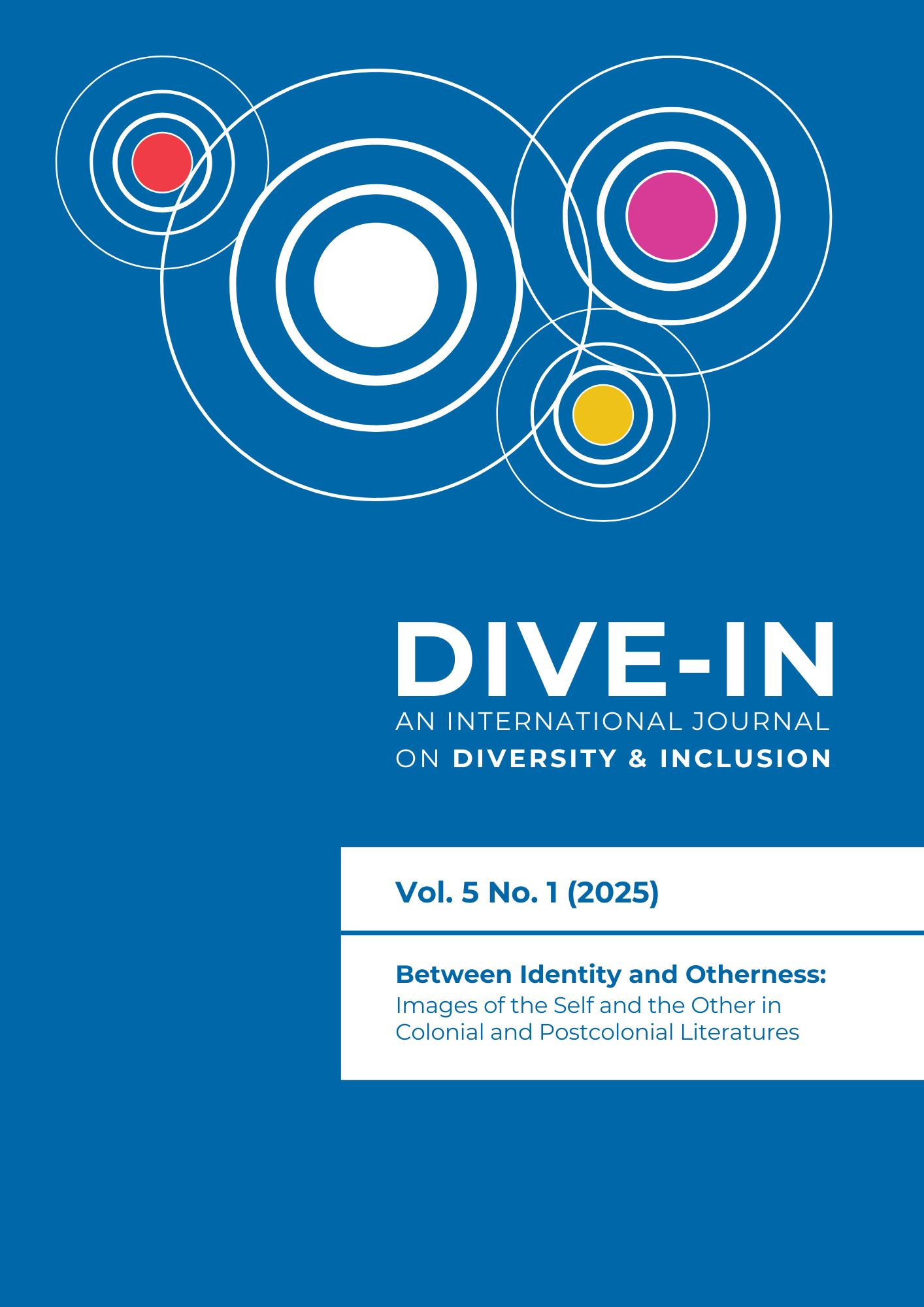Il (neo)colonialismo allo specchio: Le vendredinnades di Abdellah Taïa
DOI:
https://doi.org/10.6092/issn.2785-3233/22195Keywords:
rewritings, queer studies, Gide, postcolonial studies, TaïaAbstract
The present essay intends to analyse the theme of the Other in Moroccan francophone writer Abdellah Taïa’s works L’armée du salut and Celui qui est digne d’être aimé, and the intertextual relationship they maintain with André Gide’s Si le grain ne meurt. The partially problematic application of postcolonial rewriting and vendredinnade category to these autobiographical texts will be justified by referring to cultural anthropophagy notion, ‘writing back’ practice and autofiction as an ethical act. After recalling the elements in Gide’s work that define it as an expression of the Africanist tendence of the beginning of the XX century, we will consider those parts in Taïa’s novels that illustrate the same (neo)colonial domination scheme in the contemporary context, overpassing it. Some categories introduced by the Queer Studies, such as hegemonic masculinity and performative solidarity, will be particularly useful for our analysis.
References
Albertazzi, Silvia. 2013. La letteratura postcoloniale. Dall’impero alla World Literature. Roma: Carocci.
Brignoli, Laura. 2019. “Introduzione. Interartes, o della migrazione delle diegesi”. In Laura Brignoli (ed.), Interartes. Diegesi migranti, 9-41. Sesto San Giovanni: Mimesis.
Boulé, Jean-Pierre. 2020. Abdellah Taïa, la mélancolie et le cri. Lyon: Presses universitaires de Lyon.
Clúa Ginés, Isabel. 2023. “Siglo XIX”. In Francisco Vázquez García (ed.), Historia de la homosexualidad femenina en Occidente. Madrid: Los libros de la Catarata.
Daoud, Kamel. 2013. Meursault, contre-enquête. Alger: Éditions Barzakh.
Daoud, Kamel. 2015. “L’Arabe et le vaste pays de Ô”. In Kamel Daoud, La Préface du nègre, Le Minotaure 504 et autres nouvelles, 79-140. Arles: Actes Sud, “Babel”.
Denis, Benoît. 2000. Littérature et engagement. Paris: Seuil.
Dransfeldt Christensen, Tina. 2016. “‘Writing the self’ as narrative of resistance: L’Armée du salut by Abdellah Taïa”. The Journal of North African Studies, 21 (5), 857-876.
Fumagalli, Carla. 2021. “Tretas del débil”. In Beatriz Colombi (ed.), Diccionario de términos críticos de la literatura y la cultura en América Latina. 481-485. Buenos Aires: CLACSO.
Gasparini, Philippe. 2008. Autofiction. Une aventure du langage. Paris: Seuil.
Genette, Gérard. 1982. Palimpsestes. La littérature au second degré. Paris: Seuil.
Gide, André. 1902. L’immoraliste. Paris: Gallimard.
Gide, André. 1924. Corydon. Paris: Gallimard.
Gide, André. 1954. Si le grain ne meurt [1924]. Paris: Gallimard.
Gnocchi, Maria Chiara. 2021. “Le riscritture-mondo”. In Silvia Albertazzi, Francesco Benozzo, Edoardo Balletta, Elena Lamberti, Maria Chiara Gnocchi & Francesco Vitucci, Introduzione alla World Literature. Percorsi e prospettive, 99-111. Roma: Carocci.
Gnocchi, Maria Chiara. 2022. “La vendredinnade (im)possible de Kamel Daoud”. Revue italienne d’études françaises, 12. http://journals.openedition.org/rief/9747 [ultimo accesso 15 nov 2024].
Hayes, Jarrod. 2000. Queer Nations. Marginal Sexualities in the Maghreb. Chicago: University of Chicago Press.
Kopp, Robert. 2019. “L’Algérie de Gide. Tourisme sexuel, naissance à la ‘vraie vie’ et anticolonialisme”. Revue des deux mondes, septembre 2019, 82-91.
Loureiro, Ángel. 2000. The Ethics of Autobiography. Replacing the Subject in Modern Spain. Nashville: Vanderbilt University Press.
Ludmer, Josefina. 1984. “Las tretas del débil”. In Patricia Elena González & Eliana Ortega (eds.), La sartén por el mango. Encuentro de escritoras latinoamericanas, 47-54. Puerto Rico: Ediciones Huracán.
Lucey, Michael. 1995. Gide’s Bent: Sexuality, Writing, Politics. New York: Oxford University Press.
Mellouki, Ilham. 2006. “Littérature. La génération du Je”. Tel Quel 248, n.p.
Miller, Christopher. 1985. Blank Darkness: Africanist Discourse in French. Chicago: University of Chicago Press.
Navarro Solera, Ismael. 2017. “La transgression poétique et politique par le biais du corps dans l’œuvre autofictionnelle d’Abdellah Taïa”. Expressions maghrebines 16, 1, 127-141.
Nemer, Monique. 2006. Corydon citoyen. Paris: Gallimard.
Rushdie, Salman. 1982. “The Empire Writes back with a Vengeance”. In “The Times” (UK), 3 July, 8.
Said, Edward. 1994. Culture and imperialism. London: Vintage books.
Saint-Gelais, Richard. 2016. “Révélations transfictionnelles”. @nalyses, 11 (2), 11-30.
Sanson, Hervé. 2013. “Du ‘tourisme sexuel’ à la fusion avec l’autre. D’André Gide à Jean Sénac”. Tumultes 41 (2), 99-112.
Saveau, Patrik. 2024. “Vivre à ta lumière d’Abdellah Taïa : un récit de filiation”. In Babou Diène, Modou Fatah Thiam & Mamadou Hady Ba, La littérature africaine à l’épreuve des récits de filiation. L’autofiction et le récit transpersonnel. Paris: L’Harmattan.
Schroth, Ryan K. 2016. “La solitude de l'écrivain homosexuel: entretien avec Abdellah Taïa”. The French Review 89 (3), 175-183.
Smith, Lise-Hélène. 2010. “De Deuil à mélancolie. Regard de Gide sur une Afrique orientalisée dans Voyage au Congo”, Nouvelles études francophones 25 (2), 142-158.
Spivak, Gayatri Chakravorty. 1988. “Can the Subaltern Speak?”. In Cary Nelson & Lawrence Grossberg (eds.), Marxism and the Interpretation of Culture, 271-313 Chicago: University of Illinois Press.
Still, Judith. 2000. “Not Really Prostitution: The Political Economy of Sexual Tourism in Gide’s Si le grain ne meurt”. French Studies LIV (1), 17-34.
Taïa, Abdellah. 2006. L’armée du salut. Paris: Seuil.
Taïa, Abdellah. 2007. “Retour à la mélancolie”. Libération, 19 mai 2007. https://www.liberation.fr/week-end/2007/05/19/retour-a-la-melancolie_93505/ [ultimo accesso 10 nov 2024].
Taïa, Abdellah. 2009. “Homosexualité expliquée à mère”. Tel Quel 367, n.p
Taïa, Abdellah. 2016. “Écrire et s’engager aujourd’hui”. Yagg.com, 24 février 2016. . https://www.komitid.fr/2016/02/24/edito-ecrire-et-sengager-aujourdhui-par-abdellah-taia/ [ultimo accesso 20 ott 2024].
Taïa, Abdellah. 2017. Celui qui est digne d’être aimé. Paris: Seuil.
Taïa, Abdellah. 2022. Vivre à ta lumière. Paris: Seuil.
Vilarino, Júnior. 2021. “A escrita corsária de Abdellah Taia”. ALEA 23 (2), 30-44.
Vilarino, Júnior. 2023. “Celui qui est digne d’être aimé d’Abdellah Taïa : les masculinités remises en cause”. Hybrida 7, 33-54.
Downloads
Published
How to Cite
Issue
Section
License
Copyright (c) 2025 Vincenzo Quaranta

This work is licensed under a Creative Commons Attribution 4.0 International License.





